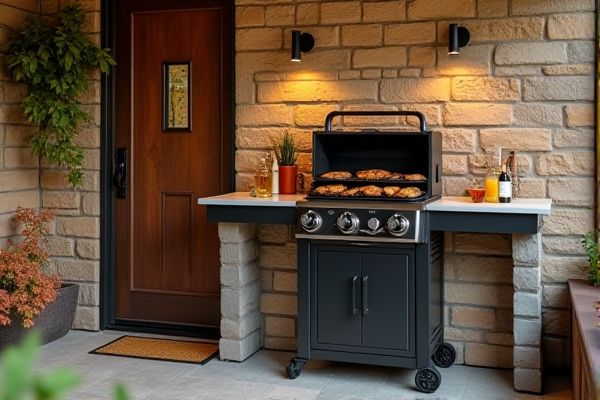
A compact grill offers portability and space-saving benefits perfect for small patios or quick meals, while a full-size BBQ delivers greater cooking capacity and versatility for large gatherings and diverse recipes. Discover which option best suits Your cooking style and needs by reading the rest of the article.
Table of Comparison
| Feature | Compact Grill | Full-Size BBQ |
|---|---|---|
| Size | Small, portable, ideal for limited space | Large, permanent or semi-permanent setup |
| Cooking Area | Typically 150-250 sq. inches | Over 400 sq. inches, multiple burners |
| Fuel Types | Charcoal, propane, electric | Charcoal, propane, natural gas, pellet |
| Heat Output | Lower BTU, suitable for small meals | High BTU, supports varied cooking styles |
| Portability | Highly portable, lightweight | Usually stationary or requires wheels |
| Price Range | $50 - $200 | $300 - $2000+ |
| Best For | Singles, small families, camping, balconies | Large gatherings, backyard BBQs, versatile cooking |
| Maintenance | Easy to clean and store | More complex, requires regular upkeep |
Introduction to Compact Grills and Full-Size BBQs
Compact grills offer portability and convenience, ideal for small spaces and casual cooking with limited fuel capacities, making them perfect for apartment balconies or camping trips. Full-size BBQs provide extensive cooking surfaces, higher heat output, and advanced features such as multiple burners, rotisserie attachments, and integrated storage, designed for large gatherings and diverse grilling techniques. Choosing between compact grills and full-size BBQs depends on space availability, cooking frequency, and desired culinary versatility.
Space and Portability Comparison
Compact grills offer superior portability and space efficiency, making them ideal for small patios, balconies, or tailgating events. Full-size BBQs require more permanent space due to their larger dimensions and heavier weight, limiting their mobility. Choosing a compact grill enhances convenience for users prioritizing easy transport and storage without sacrificing grilling capabilities.
Cooking Capacity and Versatility
Compact grills offer limited cooking capacity, ideal for small families or casual backyard use, while full-size BBQs provide extensive space suitable for large gatherings and multiple dishes simultaneously. The versatility of full-size BBQs often includes additional features like multiple burners, rotisserie options, and side burners, enhancing your ability to prepare diverse meals efficiently. Choosing the right grill depends on your specific cooking needs, balancing space constraints and the variety of dishes you want to create.
Heat Distribution and Performance
Compact grills often feature smaller cooking surfaces and less powerful burners, which can lead to uneven heat distribution and hotspots during grilling. Full-size BBQs typically incorporate multiple burners and larger grates, promoting more consistent heat distribution and superior performance for cooking larger quantities of food. The larger cooking area and advanced heat control options on full-size BBQs enhance temperature stability and grilling precision compared to compact models.
Fuel Types and Efficiency
Compact grills often utilize propane or electric fuel sources, providing quick ignition and efficient heat distribution suited for small-scale cooking. Full-size BBQs commonly offer options for charcoal, gas, or wood pellets, allowing greater fuel flexibility but typically requiring longer preheating times and increased fuel consumption. Efficiency in compact grills centers on portability and minimal fuel use, whereas full-size BBQs optimize for sustained, high-volume cooking with varied fuel types.
Setup and Maintenance Requirements
Compact grills require minimal setup with fewer components, making them ideal for quick assembly and smaller storage spaces. Full-size BBQs often involve more complex installation, including gas line hookups or charcoal trays, necessitating regular cleaning to prevent grease buildup and ensure safety. Maintenance for full-size models typically demands more time and specialized tools compared to the straightforward care routines of compact grills.
Cost and Value for Money
Compact grills generally cost less upfront, making them ideal for budget-conscious buyers seeking portability and space efficiency. Full-size BBQs, while more expensive, offer superior cooking capacity, versatile features, and durability, providing better long-term value for frequent outdoor chefs. Evaluating price per cooking area and feature set is crucial to determine the best cost-to-performance ratio for individual needs.
Ideal Use Cases: Home, Tailgating, Camping
Compact grills excel in tailgating and camping due to their portability and quick setup, making them perfect for outdoor enthusiasts and small gatherings. Full-size BBQs offer ample cooking space and higher heat output, ideal for home use where entertaining larger groups and preparing multiple dishes simultaneously is common. Choosing between the two depends on the balance between portability needs and cooking capacity for specific occasions.
Pros and Cons of Compact Grills
Compact grills offer portability and space-saving design, making them ideal for small patios and frequent travelers. Their limited cooking surface can restrict food quantity and variety, posing challenges for large gatherings. Durability and heat distribution may be less robust compared to full-size BBQs, impacting overall performance and long-term usage.
Pros and Cons of Full-Size BBQs
Full-size BBQs offer superior cooking space and higher heat output, making them ideal for large gatherings and diverse grilling techniques. However, they require significant outdoor space and demand more fuel, which may increase operational costs. Your choice depends on balancing the convenience of size with the need for capacity and performance.
 homyna.com
homyna.com